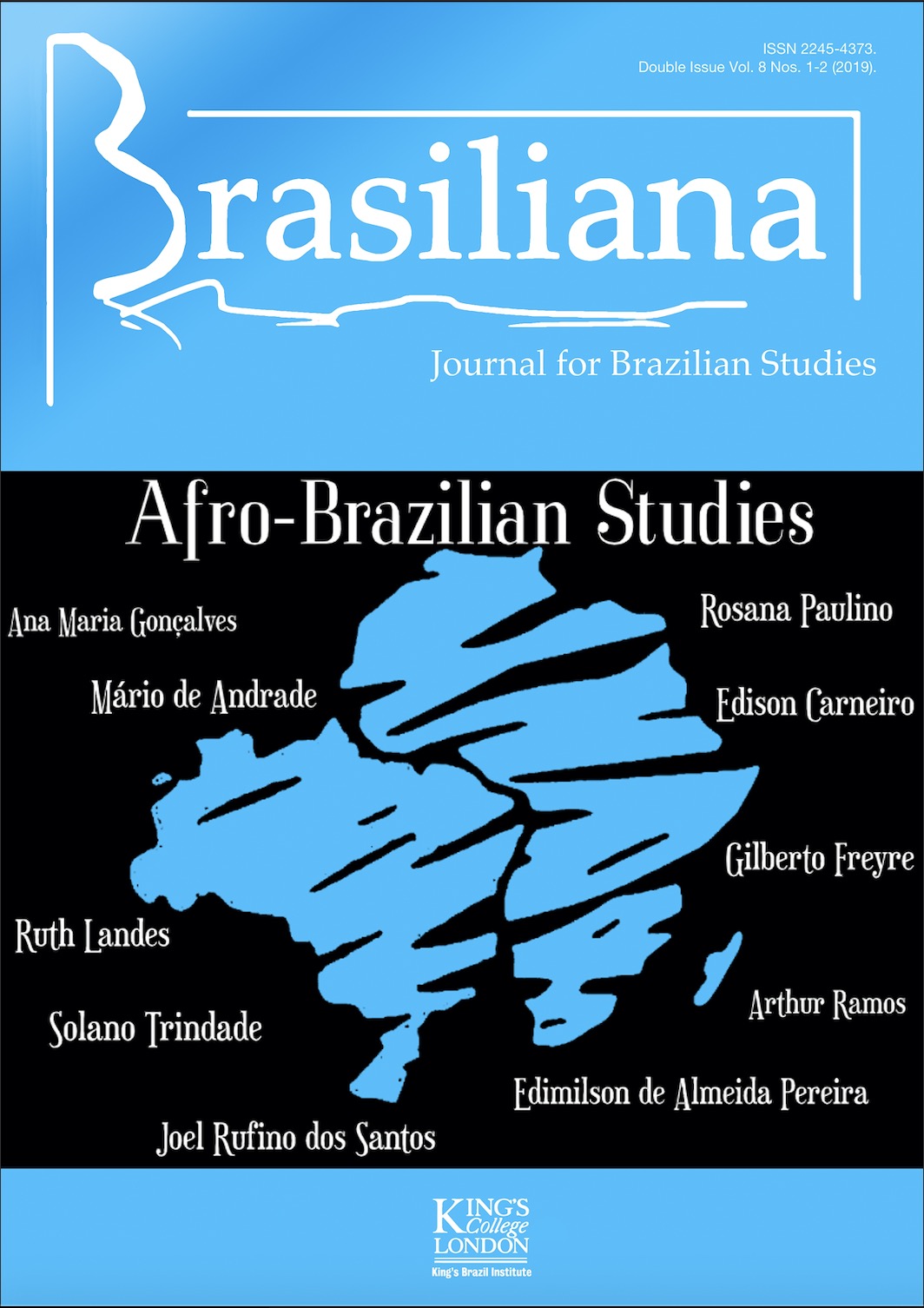Rosana Paulino and the Art of Refazimento: Reconfigurations of the Black Female Body in the Land of Racial Democracy
Main Article Content
Abstract
This essay analyzes the historical and aesthetic significance of the visual art project Assentamento(s) (2012-2013) by Rosana Paulino. Her work re- inscribes the black female body into the historical narrative of Brazil, complicating long-established notions of “Brazilianness”. By using art techniques and materials that combine lithography, digital printing, drawing, sewing, video, and sculpting, Paulino develops a multi-layered artistic assembly that she describes as a process of refazimento (“remaking”). Paulino pushes the boundaries of the historical archives, highlighting both the struggles and agency of black women within Brazilian society. I argue that, as a contemporary black woman visual artist, Paulino engages in a method of historical interpretation that Saidiya Hartman defines as “critical fabulation”. My study explores how Paulino’s refazimento represents a method of inquiry that confronts the legacies of Brazil’s racial democracy and its ideology of mestiçagem. Paulino’s visuality reclaims Afro-Brazilian ancestral memory and black female complex subjectivities.
Article Details
![]()
Articles published in Brasiliana are licensed under a Creative Commons Attribution-NonCommercial-NoDerivs 3.0 Unported License.
When publishing open access, the author signs an author publishing agreement in which they retain copyright and give Brasiliana the right to publish the article. Our Open Access publications are distributed under the terms of the Creative Commons Attribution 4.0 International License, which permits unrestricted use, distribution, and reproduction in any medium, provided the original work is properly cited.
References
“Afro-Atlantic Histories: June 28-October 21.” MASP, https://masp.org.br/en/exhibitions/afro-atlantic-histories. Accessed 3 Apr. 2019.
Agassiz, Louis. A Journey in Brazil. Boston: Ticknor and Fields, 1868.
Antonacci, Célia. “Rosana Paulino.” Vimeo, uploaded by Célia Antonacci, https://vimeo.com/111885499, 2014.
Carmo, J. O Que É Candomblé. São Paulo: Brasiliense, 2017.
Cleveland, Kimberly. “Appropriation and the Body: Representation in Contemporary Black Brazilian Art.” Journal of Black Studies, vol. 41, no. 2, 2010, pp. 301–19. JSTOR, https://www.jstor.org/stable/25780778. Accessed 29 Mar. 2019.
Dalcastagnè, Regina. “A Cor de uma Ausência: Representações do Negro no Romance Brasileiro Contemporâneo.” Afro-Hispanic Review, vol. 29, no. 2, 2010, pp. 97–108. JSTOR, https://www.jstor.org/stable/41349343. Accessed 29 Mar. 2019.
Ermakoff, George. O Negro na Fotografia Brasileira do Século XIX. G. Ermakoff Casa Editorial, 2004.
Hartman, Saidiya. “Venus in Two Acts.” Small Axe, vol. 12, no. 2, July 2008, pp. 1–14. Project MUSE, https://muse.jhu.edu/article/241115. Accessed 29 Mar. 2019.
Hartocollis, Anemona. “Who Should Own Photos of Slaves? The Descendants, Not Harvard, a Lawsuit Says.” The New York Times, 23 Mar. 2019. NYTimes.com, https://www.nytimes.com/2019/03/20/us/slave-photographs-harvard.html.
hooks, bell. “Black Women Intellectuals.” Breaking Bread: Insurgent Black Intellectual Life, edited by bell hooks and Cornel West, Routledge, 2016, pp. 147-164.
Hordge-Freeman, Elizabeth. The Color of Love: Racial Features, Stigma and Socialization in Black Brazilian Families. University of Texas Press, 2015.
Lavrin, Asunción. Sexuality and Marriage in Colonial Latin America. U of Nebraska Press, 1992.
Lorde. A. “The Uses of the Erotic: The Erotic as Power”. Sister Outsider: Essays and Speeches. New York: Crossing Press, 2007. pp. 53-59.
Marques, Tatiana Lee, and Rafael Schultz Myczkowski. “Identidade Tecida: Rosana Paulino Costurando Os Sentidos Da Mulher Negra.” Revista :Estúdio, vol. 7, no. 13, Mar. 2016, pp. 95–103. SciELO, http://www.scielo.mec.pt/scielo.php?script=sci_abstract&pid=S1647-61582016000100010&lng=pt&nrm=iso&tlng=pt.
Maurício, George, and Vera de Oxalá. O Candomblé Bem Explicado: Nações Bantu, Iorubá e Fon. São Paulo: Pallas Editora, 2015.
Morrison, Toni. “The Site of Memory”. Inventing the Truth: The Art and Craft of Memoir. Edited by William Zinsser, Mariner Books, 1998, pp. 83-102.
Oliveira, Alecssandra M. de. “Mulheres, Negras e Perigosas.” Jornal da USP, 18 Dec 2017, https://jornal.usp.br/artigos/mulheres-negras-e-perigosas/. Accessed 3 Apr. 2019.
Nascimento, Abdias do. “Quilombismo: An Afro-Brazilian Political Alternative.” Journal of Black Studies, vol. 11, no. 2, 1980, pp. 141–78. JSTOR, https://www.jstor.org/stable/2784225.
Nascimento, Elisa Larkin. The Sorcery of Color: Identity, Race, and Gender in Brazil. Temple University Press, 2008.
Orie, Ọlanikẹ Ọla. “The Structure and Function of Yoruba Facial Scarification.” Anthropological Linguistics, vol. 53, no. 1, 2011, pp. 15–33. Project MUSE, doi:10.1353/anl.2011.0000.
Paulino, Rosana. “Artist Statement.” Callaloo, vol. 37, no. 4, Oct. 2014, pp. 913–16. Project MUSE, doi:10.1353/cal.2014.0153.
Paulino, Rosana. Personal Interview. 12 July 2018.
Pinho, Osmundo de Araújo. “O Efeito do Sexo: Políticas de Raça, Gênero e Miscigenação.” Cadernos Pagu, no. 23, Dec. 2004, pp. 89–119. SciELO, http://www.scielo.br/scielo.php?pid=S0104-83332004000200004&script=sci_abstract&tlng=pt
Ribeiro, Antonio. “Atlântico Vermelho”, Rosana Paulino, http://www.rosanapaulino.com.br/blog/wp-content/uploads/2018/08/atlantico-vermelho-lisboa-antonio-ribeiro-english.pdf. Accessed 29 Mar. 2019.
Spillers, Hortense J. “Mama’s Baby, Papa’s Maybe: An American Grammar Book.” Diacritics, vol. 17, no. 2, 1987, pp. 65–81. JSTOR, JSTOR, doi:10.2307/464747.

